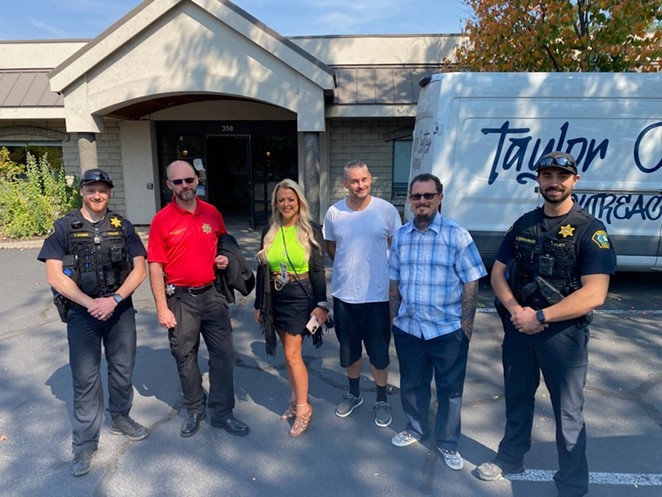It’s been a little over a month since a new state law went into effect recriminalizing minor drug possession and encouraging law enforcement agencies to connect those caught with small amounts of drugs to treatment programs in lieu of criminal charges. Numbers are just coming out on the impact so far.
Deschutes County Sheriff’s Deputy Neil Marchington, the program coordinator for the county, says that out of nine eligible candidates for deflection, seven are making their way through the new program.
To be eligible, a person must be caught with a misdemeanor-qualifying amount of drugs, be willing to engage in treatment and be approved by a parole or probation officer. They also cannot be a sex offender, have a violent criminal past, be combative or too intoxicated or mentally ill to engage with treatment or live a prohibitive distance from treatment centers, among other things.
“In my 17 years as a deputy, I’ve never seen jail alone fix addiction,” Marchington said. “I see treatment work again and again.”
tweet this
These qualifications, Marchington said in his report at the most recent Public Safety Coordinating Council meeting, are modeled after Marion County’s Law Enforcement Assisted Diversion program which has been around since 2018.
The first deflection in the county was on September 5, just days after the law took effect. Marchington said that officers in Redmond found a man “nodding off in a car after using fentanyl.” Believing he was about to drive away and commit a DUII, they asked if he would want to participate in the new program instead. The man cooperated and they took him into the deflection center. Within hours he was on medication-assisted treatment and entered detox a few days later. Now, he lives at Oxford House in Bend, a sober living facility.
“In my 17 years as a deputy, I’ve never seen jail alone fix addiction,” Marchington said. “I see treatment work again and again.”

Deschutes County’s deflection program involves cooperation from city police departments, the county sheriff’s office and nonprofits. The county was granted $844,000 to launch and run the program through July 2025. It’s not clear yet what the continued funding source or amount will be, according to material presented at the meeting.
In addition to quickly pulling together resources and outside community groups to help launch deflection, Marchington said he also needed to train officers throughout the county on the new program – a feat made more difficult because of many officers’ inexperience.
“A quarter or more of our force has never worked in a world where minor possession was illegal,” Marchington said. In 2020, Oregon voters approved Measure 110, the drug decriminalization petition initiative that made user amounts of drugs legal in Oregon. Oregon lawmakers effectively repealed that measure with the passage of HB 4002 in 2024.
Bend Police Chief Mike Krantz was also at the meeting and agreed with Marchington’s assessment. “Seventy-two percent of Bend’s police force has less than five years on patrol,” Krantz said. “When you look at that, drugs haven’t been illegal the majority of their careers…Our folks are learning how to reengage, how to do drug work and where that takes them.”
In Bend, the police department did not complete training until mid-September, making it even earlier in the reporting period for meaningful numbers.












![In Oregon House 53 Race, Redmond School Board Director Keri Lopez Challenges Incumbent Emerson Levy ▶ [With Video]](https://media2.bendsource.com/bend/imager/in-oregon-house-53-race-redmond-school-board-director-keri-lopez-challenges-incumbent-emerson-levy/u/r-bigsquare/21950087/news1-1-99c5c68a83fe563a.jpg?cb=1727909065)













